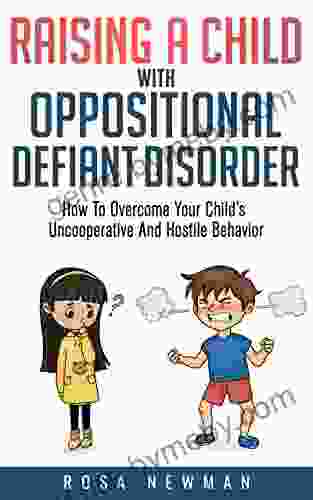Unlocking the Power of Cooperation: A Comprehensive Guide to Handling Uncooperative and Hostile Child Behavior

5 out of 5
| Language | : | English |
| File size | : | 1365 KB |
| Text-to-Speech | : | Enabled |
| Screen Reader | : | Supported |
| Enhanced typesetting | : | Enabled |
| Word Wise | : | Enabled |
| Print length | : | 111 pages |
Uncooperative and hostile behavior in children can be a disheartening and perplexing situation for parents. These behaviors can manifest in a variety of ways, such as refusing to follow instructions, arguing, tantrums, physical aggression, or withdrawal. While it's important to remember that every child is unique and the causes of their uncooperative behavior may vary, there are general strategies that can help parents effectively address these challenges. This article aims to provide a comprehensive guide to understanding the underlying reasons for uncooperative and hostile behavior, and offers evidence-based solutions to help parents promote cooperation and foster a positive parent-child relationship.
Understanding the Causes of Uncooperative and Hostile Behavior
Before diving into effective strategies for managing uncooperative behavior, it's crucial to understand the potential underlying causes. These can range from developmental factors to environmental influences and include:
- Temperamental Factors: Some children are naturally more prone to strong emotional reactions, impulsivity, and difficulty regulating their emotions. These temperamental traits can contribute to uncooperative and hostile behavior.
- Attention-Seeking: Children may engage in uncooperative behavior to gain attention from their parents or caregivers. This is especially common when children feel neglected or overlooked.
- Power Struggles: As children grow and develop a sense of independence, they may begin to assert their power and control. This can lead to power struggles with parents, resulting in uncooperative behavior.
- Frustration and Anxiety: Children who experience frustration or anxiety may struggle to express their emotions appropriately. This can manifest as uncooperative or hostile behavior.
- Environmental Factors: The home environment can significantly influence a child's behavior. Factors such as inconsistent parenting, harsh discipline, or a lack of positive reinforcement can contribute to uncooperative behavior.
Effective Strategies for Handling Uncooperative Behavior
Once you have a better understanding of the potential causes of your child's uncooperative behavior, you can begin to implement effective strategies to address it. Here are some evidence-based techniques:
- Establish Clear Expectations and Boundaries: Children need to know what is expected of them. Establish clear rules and boundaries, and ensure that they are age-appropriate and consistently enforced.
- Practice Positive Discipline: Avoid harsh punishments or physical discipline. Instead, focus on using positive discipline techniques that encourage cooperation and respect. This may involve setting limits, providing clear consequences for misbehavior, and rewarding positive behavior.
- Active Listening and Empathy: When your child exhibits uncooperative behavior, take the time to listen to their perspective. Show empathy and understanding, even if you don't agree with their behavior. This will help your child feel heard and valued.
- Identify Triggers: Pay attention to the situations or events that seem to trigger your child's uncooperative behavior. Once you identify these triggers, you can work together to develop strategies for managing them.
- Collaboration and Choice: Involve your child in the process of setting rules and consequences. Giving them a sense of choice and autonomy can help foster cooperation and reduce resistance.
Strategies for Handling Hostile Behavior
In addition to uncooperative behavior, children may also display hostility towards their parents or caregivers. Hostile behavior can include verbal aggression (such as name-calling or cursing),physical aggression (such as hitting or kicking),or emotional aggression (such as withdrawing or refusing to talk). While it's important to take hostile behavior seriously, it's also crucial to address it with empathy and understanding. Here are some strategies:
- Stay Calm and Composed: When your child is displaying hostile behavior, it's essential to stay calm and composed. Reacting with anger or hostility will only escalate the situation.
- Set Firm Boundaries: While it's important to be understanding, it's also crucial to set firm boundaries and let your child know that hostile behavior is unacceptable. Explain the consequences for hostile actions.
- Explore Underlying Causes: Hostile behavior can be a symptom of underlying emotional distress. Explore potential causes with your child and seek professional help if necessary.
- Focus on Positive Interactions: Make an effort to increase positive interactions with your child. Spend quality time together, engage in activities they enjoy, and offer praise and encouragement.
Seeking Professional Help
While implementing these strategies can be effective in many cases, there may be situations where professional help is necessary. Consider seeking professional advice if:
- Your child's uncooperative or hostile behavior is persistent and significantly impacting their daily life.
- You have tried various strategies without success.
- You are concerned about your child's emotional well-being or safety.
A therapist or counselor can help you identify the underlying causes of your child's behavior and develop personalized strategies for addressing them. They can also provide support and guidance for parents, fostering a positive and cooperative parent-child relationship.
Uncooperative and hostile child behavior can be a challenging experience for parents. However, by understanding the potential causes and implementing effective strategies, you can help promote cooperation and foster a positive parent-child relationship. Remember, each child is unique, and what works for one may not work for another. Be patient, consistent, and seek professional help when necessary. With love, support, and the right strategies, you can help your child overcome these challenges and thrive.
5 out of 5
| Language | : | English |
| File size | : | 1365 KB |
| Text-to-Speech | : | Enabled |
| Screen Reader | : | Supported |
| Enhanced typesetting | : | Enabled |
| Word Wise | : | Enabled |
| Print length | : | 111 pages |
Do you want to contribute by writing guest posts on this blog?
Please contact us and send us a resume of previous articles that you have written.
 Book
Book Novel
Novel Page
Page Chapter
Chapter Text
Text Story
Story Genre
Genre Reader
Reader Library
Library Paperback
Paperback E-book
E-book Magazine
Magazine Newspaper
Newspaper Paragraph
Paragraph Sentence
Sentence Bookmark
Bookmark Shelf
Shelf Glossary
Glossary Bibliography
Bibliography Foreword
Foreword Preface
Preface Synopsis
Synopsis Annotation
Annotation Footnote
Footnote Manuscript
Manuscript Scroll
Scroll Codex
Codex Tome
Tome Bestseller
Bestseller Classics
Classics Library card
Library card Narrative
Narrative Biography
Biography Autobiography
Autobiography Memoir
Memoir Reference
Reference Encyclopedia
Encyclopedia Richard Headstrom
Richard Headstrom Samuel John
Samuel John Rosina Acheampong
Rosina Acheampong Stephenie Meyer
Stephenie Meyer Lisa Dunn
Lisa Dunn William Trubridge
William Trubridge Mary Ann Shaffer
Mary Ann Shaffer Larissa Brown
Larissa Brown William H Shellenberger
William H Shellenberger Stephen J Gill
Stephen J Gill Richard Weissbourd
Richard Weissbourd Ovidiu Calin
Ovidiu Calin Ts Rhodes
Ts Rhodes Sara Pyszka
Sara Pyszka Robert K Massie
Robert K Massie Victoria Allman
Victoria Allman Murray Peden
Murray Peden Lonnie Wheeler
Lonnie Wheeler Wallace D Wattles
Wallace D Wattles Patrick A Gaughan
Patrick A Gaughan
Light bulbAdvertise smarter! Our strategic ad space ensures maximum exposure. Reserve your spot today!

 Jaylen MitchellEmpowering Women with PCOS: Discover the Ultimate Guide to Manage and Thrive
Jaylen MitchellEmpowering Women with PCOS: Discover the Ultimate Guide to Manage and Thrive Harry HayesFollow ·10.2k
Harry HayesFollow ·10.2k Henry Wadsworth LongfellowFollow ·6.1k
Henry Wadsworth LongfellowFollow ·6.1k Galen PowellFollow ·6.9k
Galen PowellFollow ·6.9k Corbin PowellFollow ·11.8k
Corbin PowellFollow ·11.8k Alexandre DumasFollow ·8k
Alexandre DumasFollow ·8k Billy PetersonFollow ·2.9k
Billy PetersonFollow ·2.9k Carson BlairFollow ·6.5k
Carson BlairFollow ·6.5k Bryson HayesFollow ·6.3k
Bryson HayesFollow ·6.3k

 Lee Simmons
Lee SimmonsUnveiling the Enchanting Emerald Isle: A Literary Journey...
A Tapestry of Breathtaking...

 Thomas Hardy
Thomas HardyUnveiling Costa Rica's Enchanting Essence with Lonely...
Embark on an Unforgettable Costa Rican...
 Bryan Gray
Bryan GrayLifting the Veil of Sorrow: A Beacon of Hope for Widowers
Embrace Healing and Find Solace in the...

 John Updike
John UpdikeGrow Your Business and Legacy: An Inspiring Guide for...
Growing Up In The Family Business is an...

 Harrison Blair
Harrison BlairLonely Planet's Western Europe Travel Guide: Your...
Are you planning an unforgettable...
5 out of 5
| Language | : | English |
| File size | : | 1365 KB |
| Text-to-Speech | : | Enabled |
| Screen Reader | : | Supported |
| Enhanced typesetting | : | Enabled |
| Word Wise | : | Enabled |
| Print length | : | 111 pages |












